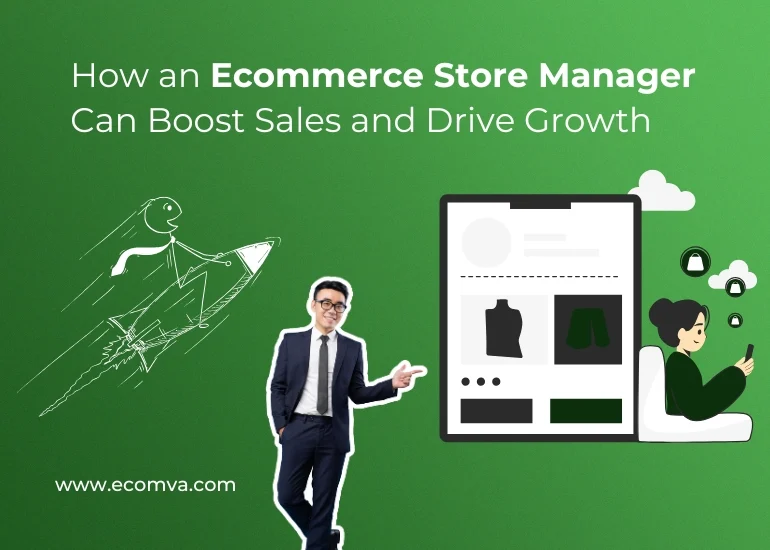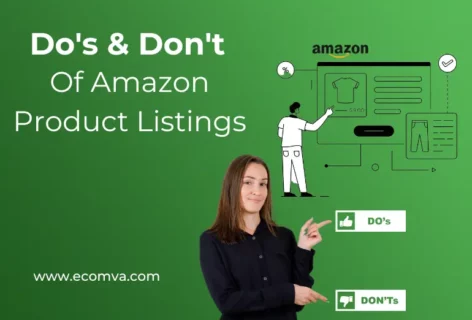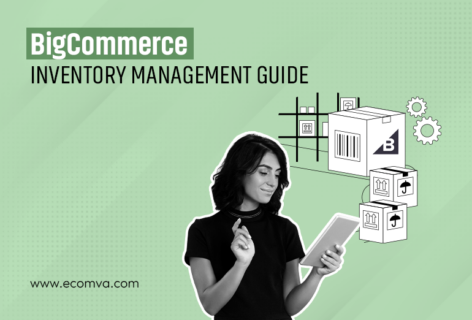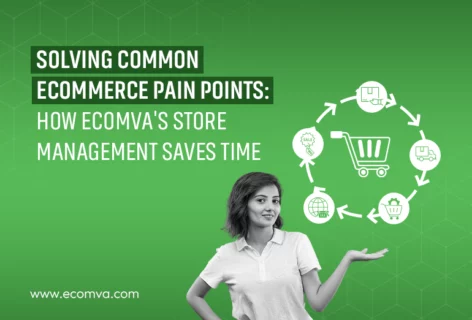How an Ecommerce Store Manager Can Boost Sales and Drive Growth

Your Store Looks Great — But Are You Really Winning Sales?
Designing a sleek website and listing your products is just the start. What happens when inventory errors creep in or customer questions go unanswered?
Sales slip away — often without you noticing. This is why ecommerce store management is a game-changer.
Hiring an expert can turn your online store from “just okay” to a revenue-generating powerhouse. With the right ecommerce management services, you ensure no opportunity is left on the table.
Why Is an Ecommerce Store Manager Important?
The role of an ecommerce store manager can be described as the person who keeps a watchful eye over your online store and makes sure that it runs smoothly.
From product listings to marketing campaigns, they manage the full-fledged processes that directly affect sales as well as overall customer satisfaction. With the right online store management services, it does not matter if you are a startup or well established business, you can scale efficiently.
Key Ways an Ecommerce Store Manager Boosts Sales
1. Strategic Product Management
Your product catalog is the basis of your online store. Long term success can only be achieved by having effective product management in place which will allow customers to get what they came for, while also enticing them to buy additional products.
An ecommerce manager ensures that:
- Product descriptions are captivating, not overly wordy, and have relevant keywords.
- Products are shown using great pictures that do them justice.
- Pricing strategies remain competitive yet profitable.
- Sufficient levels of inventory are maintained to avoid stockouts or overstocking.
Pro Tip: Adding customer reviews on product pages can help institute trust with potential customers and sway their buying decisions. For example, showing reviews can improve conversion rates by 190% for lower priced items and 380% for higher priced items.
2. Optimizing the Customer Journey
An ecommerce store manager adjusts the structure of your website to confirm that visitors can easily move about your online store. This includes:
- Improving navigation on the website to enable easy discovery of products.
- Making checkout procedures more efficient to lower cart abandonment. Addressing these problems is essential, as 48% of online buyers abandon their carts because of additional expenses like shipping.
- Implementing abandoned cart recovery strategies to win back potential customers.
By minimizing friction throughout the buying journey, ecommerce store management services help boost both sales and customer retention.
3. Managing Promotions and Discounts
Promotions that are carefully thought out are crucial to raising sales. An ecommerce store manager can:
- Create focused marketing campaigns to draw in new clients.
- Create customized discounts by using consumer data.
- Effectively handle promotional codes, package offers, and loyalty schemes.
Product store management services guarantee that promotions have the most possible impact by matching discounts to consumer preferences and purchasing patterns.
4. Handling Customer Support
Customer satisfaction directly influences repeat sales. An ecommerce manager ensures customer interactions are smooth by:
- Providing timely responses to queries and complaints.
- Managing customer reviews to improve brand reputation. Given that nearly 95% of consumers read online reviews before making a purchase, maintaining positive reviews is essential.
- Coordinating with a virtual assistant for ecommerce store to offer 24/7 support.
This proactive approach strengthens customer trust and increases loyalty.
5. Data-Driven Decision Making
Successful ecommerce businesses depend on data to make informed decisions. A skilled store manager consistently analyzes:
- Sales trends to identify best-selling products.
- Customer behavior to refine marketing strategies.
- Key metrics like bounce rates, conversion rates, and average order value to improve website performance.
Ecommerce management services make strategic adjustments that align with your business goals with insights from data.
6. Managing Small Tasks for Efficiency
For growing stores, outsourcing tasks is essential to manage workload. An online store management assistant can:
- Provide ecommerce virtual assistant services to handle repetitive tasks like order processing and customer support.
- Take up tasks such as product uploads, inventory tracking, and content creation.
This ensures that you can focus on strategy while routine operations run efficiently.
7. SEO and Content Optimization
An ecommerce manager ensures your store ranks high in search results by:
- Implementing targeted keyword strategies.
- Making sure that product pages are optimized for search engines.
- Updating content regularly to keep visitors engaged.
A virtual store management assistant helps your store attract organic traffic and gain visibility. Because:
“It is not your customer’s job to remember you, it is your obligation and responsibility to make sure they don’t have the chance to forget you.”
– Patricia Fripp, Professional Keynote Speaker
8. Building Strong Supplier Relationships
Effective supplier management ensures you maintain consistent inventory levels and secure better pricing. An ecommerce manager:
- Builds and nurtures supplier partnerships.
- Ensures timely stock replenishment.
- Manages disputes or quality concerns with suppliers.
A reliable supply chain keeps customers satisfied and prevents missed sales opportunities.
9. Streamlining Order Fulfillment
Fast and accurate order fulfillment plays a crucial role in customer satisfaction. An ecommerce manager ensures:
- Orders are processed promptly.
- Shipping times are optimized for faster deliveries.
- Refunds and returns are managed efficiently.
This efficient process reduces customer frustration and encourages repeat business.
10. Utilizing Automation for Efficiency
Modern ecommerce tools can simplify time-consuming tasks. An ecommerce manager can implement automation solutions to:
- Schedule social media posts and email campaigns.
- Automate inventory updates to prevent overselling.
- Set up chatbots for instant customer support.
Automation allows ecommerce store management to operate efficiently even during peak seasons.
11. Developing a Growth Strategy
A proactive ecommerce store manager doesn’t just maintain your store — they actively drive growth. Key initiatives may include:
- Identifying new sales channels like marketplaces or social commerce.
- Collaborating with marketing teams to create targeted campaigns.
- Monitoring competitors to adjust pricing, promotions, and content strategies.
By continuously seeking growth opportunities, ecommerce store management services ensure your store stays ahead of the competition.
12. Managing Crisis Situations
Unexpected issues — from website crashes to supply chain delays — can impact your store’s sales. An ecommerce manager:
- Develops contingency plans for technical issues.
- Handles customer communications during disruptions.
- Ensures minimal downtime through proactive solutions.
With an experienced manager at the helm, your business can respond quickly to challenges.
For additional insights, explore our related guide:
The Essential Guide to Ecommerce Store Management with Virtual Assistants
Why Hire an Ecommerce Store Manager from eComVA?
With eComVA, you’re not just getting basic support — you’re investing in experienced professionals who deliver accuracy, precision, and reliability.
Here’s why businesses trust us:
- Save 75% on operating costs — Lower expenses without compromising on quality.
- Reclaim 78% of your time — Focus on growth while we handle the routine.
- Trusted by 350+ ecommerce businesses — Proven expertise across diverse industries.
- 7 comprehensive services in one solution — From inventory to shipment management, we cover it all.
Hear It From Our Happy Clients
Still unsure? Let our satisfied clients share their experiences. From improved store efficiency to seamless communication, eComVA has earned the trust of businesses worldwide.
“First off I would like to say how honoured I am to work with the eComVA team. They have been nothing short of incredible. Very hands-on teamwork ethic everyone is willing to learn and great communication”
— Zack Benson
“I am so grateful to have the eComVA Team working with me on my project. The entire team’s work is impeccable. I could not have hoped to have found a better partner to help.”
— Malcolm Edwards
Let’s Simplify Your Store Management!
Contact us today for a FREE consultation and hire product store management VA. See how we can help your store grow with flawless management strategies.
Your ecommerce success starts with smart management — and that’s exactly what ecommerce management services from eComVA deliver.
FAQs
1. What does a store management virtual assistant do?
A store management virtual assistant helps run your online shop smoothly. They take care of product uploads, inventory tracking, customer service, and order processing — so nothing falls through the cracks.
2. How can a virtual assistant help increase my ecommerce sales?
They keep your store organised and running well, fix website issues, respond to customers quickly, and help with marketing and promotions. This boosts customer satisfaction and helps turn more visitors into buyers.
3. What is the average cost of hiring a virtual assistant for online store management?
Costs vary depending on the tasks and hours needed. However, many businesses save up to 75% in operating costs by hiring a VA.
4. Which ecommerce platforms do virtual assistants specialise in?
Most ecommerce virtual assistants have the expertise to work with platforms like Shopify, WooCommerce, BigCommerce, Magento, Amazon, and eBay. So, just let them know your platform, and they’ll get to work.










